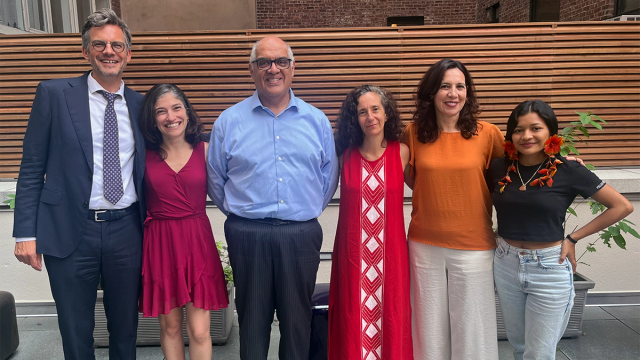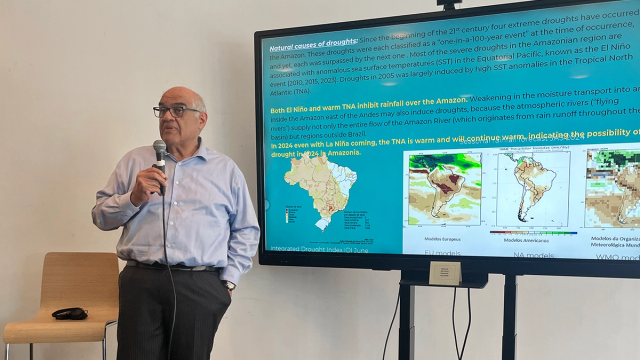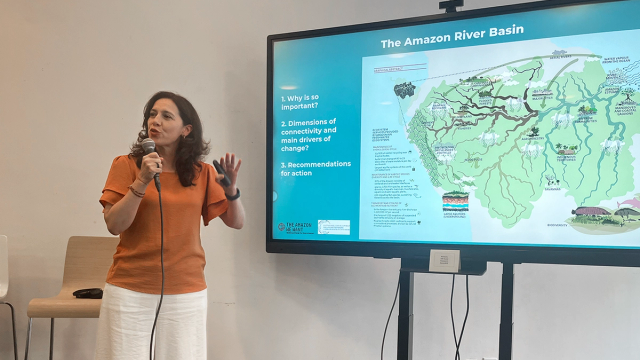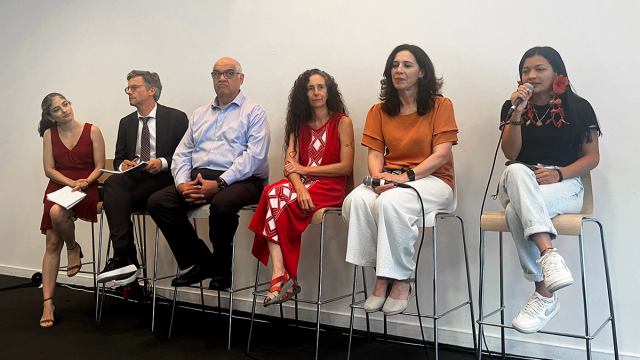Amazonian Resilience: Insights from SPA's UN HLPF Side Event
On July 8, 2024, the Science Panel for the Amazon (SPA) hosted a side event titled "Amazonian Resilience: Addressing Drought and Water Connectivity" on occasion of the UN High-Level Political Forum in New York City. This event launched the latest SPA Policy Briefs on Droughts and Freshwater Ecosystem Connectivity, with lead authors presenting key messages and recommendations for the Amazon's conservation and sustainable development. A panel discussion featuring Young Amazonian Indigenous Leader, Beka Munduruku, and Erwin De Nys from the World Bank followed the presentations, offering key insights about potential solutions to address the impacts of climate change and environmental degradation in the Amazon region.
Isabella Leite Lucas, SPA Senior Manager, served as moderator and kicked off the event by reflecting on the Amazon's local, regional, and global significance, highlighting the need for conservation amid growing threats. She welcomed SPA Lead Authors, Dr. José Marengo and Dr. Flavia Costa, who presented the Policy Brief, “Droughts in the Amazon," which examines natural and human-induced causes of drought, ecological and socio-economic impacts, and provides policy-relevant recommendations for mitigation and adaptation. Dr. Marengo explained that the Amazon is currently experiencing an increasing frequency and intensity of strong droughts, correlating with deforestation and global warming, as seen with the historic 2023 drought. Dr. Costa shared severe ecological and socio-economic consequences of these extreme droughts, including increased tree mortality, diminished carbon sink capacity, catastrophic animal deaths, and increased food and water security across the Amazon.
Next, SPA Lead Author, Dr. Andrea Encalada, presented the Policy Brief, “Conserving the Amazon’s Freshwater Ecosystems’ Health and Connectivity," which stresses the importance of multidimensional connectivity of Amazonian freshwater ecosystems for biodiversity and livelihoods in the region. The brief highlights key challenges and recommended actions for protection and restoration, and the importance of involving Indigenous Peoples and Local Communities (IPLCs) in these efforts. Dr. Encalada highlighted the Amazon Basin's significance, home to over 48 million people and essential for global freshwater flow.
During the panel discussion, Beka Munduruku, a member of the SPA Strategic Committee, shared insights on the impacts of droughts on Indigenous and riverine communities, emphasizing their role in defending biodiversity. She called for global attention to illegal activities in Indigenous Territories and stressed the importance of youth involvement in implementing solutions. Erwin De Nys, from the World Bank, underscored the value of academia and science, including the contributions of the SPA, in addressing climate change. He also shared a call to action due to the severity of droughts and their cross-cutting consequences in the Amazon, including the fragmentation of connectivity and impacts on local communities. Erwin highlighted several programs led by the World Bank in the Amazon region, such as the efforts of the Global Environment Facility (GEF) and Amazon Sustainable Landscapes Program (ASL), as well as the Amazonia Viva program, which focuses on the key pillars for a green Amazon.
The panelists collectively called for immediate action to address climate change and destructive activities in the Amazon, emphasizing collaboration among local communities, policymakers, scientists, and international organizations. During the Q&A session, Flavia Costa highlighted the need for better funding accountability, Andrea Encalada stressed capacity building for project implementation, and José Marengo emphasized the need for coordinated efforts for impactful outcomes.
Questions about technological development led to discussions on revamping systems for resilience and local community engagement. The panelists highlighted the importance of integrating Indigenous and Local Knowledge (ILK) with scientific approaches and respecting IPLCs' agendas and cultures. Isabella Leite Lucas concluded by reiterating the need for translating science into actionable solutions, fostering stakeholder collaboration, and respecting local knowledge systems for a sustainable Amazon.
Watch the complete event here: YouTube recording
Access the Policy Briefs here: SPA Reports



